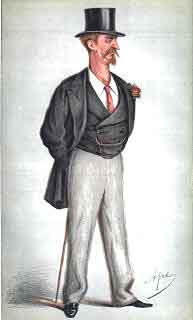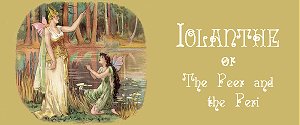You are here: > Iolanthe > Opening Night Cast

Adapted from the book "Tit-Willow or Notes and Jottings on Gilbert and Sullivan Operas" by Guy H. and Claude A. Walmisley (Privately Printed, Undated)
Affidavit. A statement in writing sworn or deposed to before a magistrate or other proper officer such as a Commissioner for Oaths. The form of evidence generally used in Chancery proceedings.
Andersen's Library. Hans Christian Andersen (1805-1875). Perhaps the most gifted writer of fairy tales, such as "The Ice Maiden", that the world has known. Born and died in Denmark.
Arrest of Judgement. An unsuccessful defendant might move that the judgment for the plaintiff be arrested or withheld, in spite of a verdict having been given, on the ground that there had been some substantial miscarriage of justice.
Banbury. Banbury cakes. An English municipal borough 22 miles north of Oxford, famous for its cross, cakes and puritan zeal. The castle was destroyed in the Civil War (1642-49) and the cross of nursery-rhyme fame was destroyed in 1602, though a new cross was erected in 1859. Banbury cakes are still made and the cake shop in Parsons Street has the original 17th century ovens.
Baring, Sir Francis. Born near Exeter in 1740; died in Kent 1810. An English financier and founder of the house of Baring Brothers & Co. Wrote "Observations on the Establishment of the Bank of England" (1797) etc.
Canaille (French) Rabble. Originally "a pack of dogs". The lowest order of the people collectively; the vulgar.
Captain Shaw. (See Shaw, Captain).Commit for contempt of Court. Contempt of Court is a disobedience of the rules, orders or process of a Court which has power to punish for such offence by attachment or arrest (committal).
Common Pleas. (See Exchequer).
Deceased Wife. (See Marriage with deceased wife's sister.)Divorce. (See Exchequer.)
Does your Mother know you're out? A jeering remark, usually addressed in those days to a presumptuous youth or to a silly simpleton.
Dolce far niente. (Italian.) The luxury of complete idleness.Equity draughtsman and conveyances. Now a self-conferred title frequently assumed by Junior Counsel practising in the Chancery Division. Formerly "equity draughtsman" meant one settling pleadings or their equivalent (bills) in Chancery; as contrasted with "special pleaders" who settled pleadings under the old system in Common Law Courts. There were formerly "Special Pleaders" and also "Conveyancers" who held a kind of half and half position without right of audience in the Courts.
Evidence Not. (See Not Evidence.)Exchequer, Queen's Bench, Court of Pleas and Divorce. The first three of these Courts were very old. The queen's Bench was so called because the King himself originally sat in this Court which heard cases in which the Crown was a party.
The Court of Common Bench, the name of which was soon changed to Court of Common Pleas, heard cases between private individuals.
The Court of Exchequer was at first the revenue department, its business being the collection of the King's debts. (See Introduction to Trial by Jury.)
These three Courts were in existence at the time of Magna Carta (1215) and the Court of Exchequer later became purely a Court of Justice whose judges, called Barons, were in 1579 placed on an equity with the judges of the other two Courts. The Court for Divorce and Matrimonial Causes was formed in 1857. Prior to this date divorce was really only possible for the rich, it being necessary for the husband first to obtain damages against the man (now called the co-respondent) who had gone off with his wife, then to obtain a divorce in the Ecclesiastical Court and finally to go to the House of Lords and get a private Act of Parliament passed.
Festina lente. (Latin) "Hasten slowly", or "do not make too great haste", and is the motto, a punning one, of the Onslow family "On-slow". Other families also use the same motto.
Friday nights. Both Houses of Parliament sit and rise early on a Friday. They do not sit Saturdays.
judgement, Arrest of. (See Arrest of judgement.)
Maravedi (Spanish) A copper coin equal to about half an English farthing.
Marriage with deceased wife's sister. A bill to this effect was brought in almost every year and passed by the House of Commons and thrown out by the House of Lords. It was the stock subject for difference of opinion. But the Act was finally passed and came into force 1 January, 1950.
"Not evidence". A reference to the rules of evidence of the English Law which do not allow certain evidence likely to be of an unsatisfactory character, e.g. hearsay evidence, to be given. Readers will remember Mr. Justice Stareleigh's remark in the "Trial" in Pickwick that "what the soldier said was not evidence".
Ovidius Naso. The celebrated Roman poet, Ovid, was born 20 March, about 43 B.C. Virgil and Horace honoured him with their correspondence, and the Emperor Augustus was his friend. Suddenly, for some mysterious reason, Ovid was banished into exile, dying seven or eight years later in his 59th year, A.D. 17. He was buried at Tomos. The reason for his exile is unknown, but it is believed to have been connected with something improper in the family or Court of the Emperor Augustus of which Ovid had knowledge or possibly in which he played a part. (See Princess Ida).Parliamentary Pickford. Pickford's vans. General carriers and removers of furniture etc.
Peri. A fairy. In Persian mythology, an imaginary being, male or female, descended from fallen angels and excluded from paradise till penance is accomplished. They were originally regarded as evil, but later as benevolent and beautiful. "One morn a Peri at the gate of Eden stood, disconsolate."
Plebs. (Latin) The common people—plebeians. First applied to the common people of Ancient Rome as opposed to the patricians or members of aristocratic families.
Queen's Bench. (See Exchequer.)Rothschild. Mayer Amschel Rothschild, the original founder of the House of Rothschild, was born at Frankfort in 1743. His third son, Baron Nathan Rothschild, 1777-1836, was founder of the English branch of the family. In 1805 he settled in London and became the financial agent of nearly every civilised government. The family was enormously wealthy. The surname Rothschild came from the sign "zum rothen Schilde", i.e. the red shield of the house. Formerly the houses in the Jewish quarter were not numbered, each house being distinguished by a shield of a particular colour.
Seven Dials. Seven narrow streets converging on St. Martin's Lane, near the Strand. Formerly they were streets of ill repute and therefore in strong contrast to Belgrave Square, as mentioned in Lord Tolloller's song, which was once the home of nobility.

Ties pay the dealer. An expression from the card game "vingt-et-un".
Wards of Chancery. An infant under the protection of the Court of Chancery. The general superintendence and protective jurisdiction of the Court of Chancery over the persons and property of infants is a delegation of the rights and duties of the Crown. The Lord Chancellor and his Court of Chancery representing the Sovereign who, as parens patriae is the universal guardian of infants.
(See Introduction to Iolanthe; see also Pirates of Penzance .)
Woolsack. The Lord Chancellor's seat in the House of Lords, a sack of wool in shape like a divan. In the reign of Queen Elizabeth an Act of Parliament was passed to prevent the exportation of wool; and woolsacks were placed in the House of Lords whereon the judges sat in order to keep in mind this source of our national wealth.
|
Page Created 22 August, 2011
